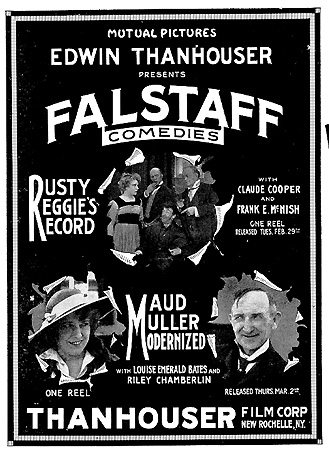 Volume II: Filmography
Volume II: Filmography Volume II: Filmography
Volume II: Filmography

Advertisement for Falstaff Comedies in REEL LIFE March 18, 1916. (F-1010)
(Falstaff)
March 2, 1916 (Thursday)
Length: 1 reel (split with Jungle Life in South America at the end)
Character: Comedy
Director: William A. Howell
Assistant director: William Sullivan
Scenario: A burlesque by Lloyd F. Lonergan of John Greenleaf Whittier's poem, Maud Muller.
Cameraman: George K. Hollister
Cast: Louise Emerald Bates (Maud Muller), Riley Chamberlin (judge)
Location: Jacksonville, Florida
Note: The filming of this subject was completed the week of January 17, 1916.
BACKGROUND OF THE SCENARIO: The Thanhouser film is a burlesque of the poem, Maud Muller, published in March 1856. The original poem is a well-known work of John Greenleaf Whittier (1802-1892), who was born to Quaker parentage in Haverhill, Massachusetts, and grew up on a farm. Supporting himself through his school days, he attended a local academy. Inspired by the poetry of Robert Burns, Whittier soon became a prolific writer and editor of numerous periodicals. He was the secretary of the American Anti-Slavery Society, a position which brought him attacks for his views. His poems expressed the sincerity and nobility of the author and have been popular ever since their initial publication.
The inspiration for this burlesque, Whittier's poem, Maud Muller, tells of a sweet, innocent country maiden who becomes enamored of a judge who stops by her farm to water his horse. The attraction is mutual, and as he rides away he wistfully contemplates her beauty and charm. As her memory lingers he realizes that his world of society and wealth is too different from hers to be reconciled with it. He weds a lady of fashion and power, and Maud takes a poor, unlearned man for a husband. As the years go by, Maud and the judge separately contemplate: "For of all sad words of tongue or pen, the saddest are these: 'It might have been.'" Non-satirical screen dramatizations of Whittier's poem were released by several companies, including Essanay (October 1909), Selig (September 1911), and Nestor (two reels, August 1912). A parody of Whittier's poem was printed in The Moving Picture News, March 16, 1912, page 23: Maud Muller Up to Date.
ARTICLE, The New Rochelle Pioneer, March 11, 1916:
"Louise Emerald Bates and Riley Chamberlin are featured in Maud Muller Modernized, a Falstaff one-reel comedy which tells of how she was a beauty until her false teeth and hair fell out, then the judge collapsed."
SYNOPSIS, Reel Life, February 26, 1916:
"The Police Court Clerk was telling the story of one of his chums at the district Political Club. 'It was Maud Muller over again,' he commenced, for the Police Court Clerk posed as a literary light among his neighbors in the 'Gas House Precinct.' 'Is that Fatty Muller's daughter?' asked his friend. 'That big bleached blonde who plays the typewriter at campaign headquarters election time?' 'No-o-o,' was the disgusted reply. 'Maud Muller was in a poem. She raked hay out in the Hick country, and said, 'Good morning, Judge,' but the Judge wouldn't marry her. He was wise. I forget that part. This other girl's name wasn't Maud Muller. She said, 'God morning, Judge,' but Clancy, the motorcycle cop, brought her into say it. He swore her auto had smashed a car another guy was driving, in the road and busted Clancy's tires.' 'What did the Judge do?' asked the friend. 'He fined Clancy $10,' replied the Clerk. 'The Boss was mighty smitten with that girl. I'll bet he don't run away like that rube judge in the poem.' But although the Clerk did not know it, this was exactly what the Judge did. For when next he met his charmer, she upset him with her auto and go so mussed up herself that he knew she was false - at least her hair, teeth and complexion were, and he had doubts as to her heart. So the Judge quickly made his escape, being convinced that the original Judge in the poem knew what he was doing when he hastily fled from the beauteous maiden who was demurely posing in the hay field."
REVIEW, The Moving Picture World, March 11, 1916:
"An entertaining parody on the old Maud Muller poem, with poetical subtitles. She drives a flivver, runs over the judge, and scares away his affections. A funny half-reel of the nonsensical type."
# # #
Copyright © 1995 Q. David Bowers. All Rights Reserved.